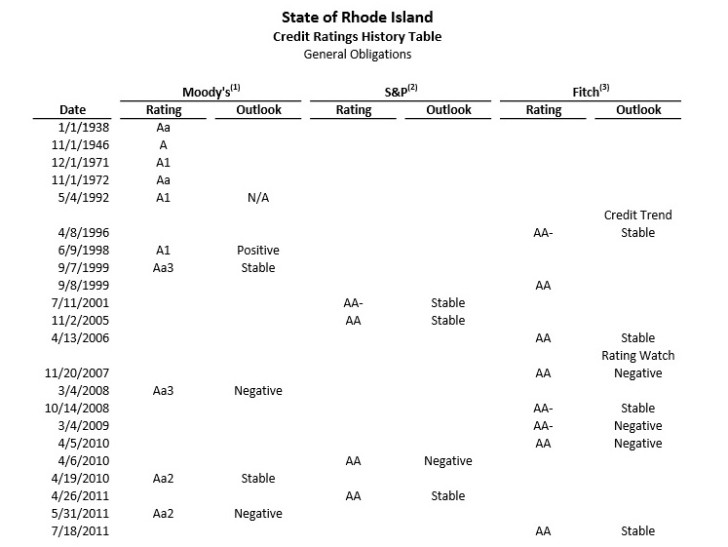INVESTIGATION: RI Has Defaulted on Moral Obligation Debt Before
Thursday, June 20, 2013
State officials have warned of potentially dire consequences if Rhode Island becomes the first state in modern memory to deliberately default on moral obligation debt—except that Rhode Island has done so before, as recently as 2006, GoLocalProv has learned.
“The issue of the state of Rhode Island having one of its quasi-public agencies issue bonds and [those] bonds running into a problem and not being fully repaid has happened in the past,” former state treasurer Frank Caprio said in an interview yesterday.
As state lawmakers wrestle over whether to pay back an estimated remaining $90 million in bonds and interest for 38 Studios, they don’t need to look very far for a precedent: in 2006, after the developer of the former American Express Building in downtown Providence went bankrupt, then-Gov. Don Carcieri was called to make good on most of a $3 million guaranty the Economic Development Corporation had made to the holder of the bonds.GET THE LATEST BREAKING NEWS HERE -- SIGN UP FOR GOLOCAL FREE DAILY EBLAST
The bondholder in this case happened not to be an investment firm, but the state pension system.
In making a plea for payment, the chief of staff for then-Treasurer Paul Tavares, George Carvalho, described the debt in terms strikingly similar to those used by state officials today to describe the 38 Studios debt. “It’s a moral obligation—if they didn’t make good on it, it could have ramifications on the state’s bond rating,” Carvalho told the Providence Journal in a November 29, 2006 report.
Carcieri refused to pay.
The state’s credit rating was not downgraded. And Wall Street appears to have barely flinched: during his entire time in office, Caprio said no credit rating analyst ever asked him about the issue. Wall Street was certainly aware of what had happened: Caprio noted that Moody’s Investors Service noted the failure to pay in a report on the 38 Studios bonds in May 2012. The nonpayment was also disclosed in the Private Placement Memo the EDC used in 2010 to inform potential investments of the opportunity to buy the bonds.
Caprio described the guaranty the EDC issued to the American Express developer as a “limited recourse guaranty” which he described as a closely related to moral obligation debt. One of the chief differences seems to be a technical one: in the case of the moral obligation bonds for 38 Studios, the Governor had to ask state lawmakers to make the appropriation. In the other instance, the EDC had to ask the Governor, who was not obligated, in turn, to pass that request on to lawmakers.
“The principle is similar,” said Gary Sasse, the former administration director for Carcieri, who said he was not involved in the deal. “There are differences in degree and there are differences in who was holding the debt.”
But Caprio said who held the bond does not make the American Express case irrelevant. He said the bonds could just as easily have been purchased by the Massachusetts state pension system or a large insurance company. “Don’t let that cloud the issue,” said Caprio, who recently announced he is running for his former office.
A troubled deal, years in the making
There are other differences as well. Unlike 38 Studios, the American Express Building did not fail almost from the get-go. Instead, the project dates back to 1989, when the Rhode Island Industrial Facilities Corporation, a legal arm of the EDC, financed the construction of the four-story office building next to the train station with $23 million in bonds it issued. The bonds were bought by the state pension system, according to new archives accessed through the LexisNexis database.
A decade later, the development suffered a setback when the original tenant for whom the building was named, American Express, relocated.
The Boston-based developer, Gateway Eight, had to refinance the mortgage with the pension fund. The EDC sweetened the deal by making a $3 million guaranty. If the pension fund foreclosed the building and wasn’t able to recover all of the money it had invested from selling it, the guaranty would make up the difference, according to news reports from the mid-2000s.
Ed Mazze, a business professor at the University of Rhode Island, pointed to a number of differences between the American Express Building and 38 Studios: there were different players involved and the deals did not have the same structure. It was also a different time as well—the mid-2000s, before the credit crisis and the recession. In addition, the current issue has become highly politicized, Mazze noted.
“I don’t think you’re comparing apples to apples,” Mazze said.
The elusive ‘moral obligation’
Others see it as a twist of fate that the state pension system took a hit on its investment in the American Express Building, given that a few years later the state reneged a second time on what many view as another moral obligation: the commitments it made to state retirees.
“The state has a moral duty to its own retirees. It should give them more consideration than it does to Wall Street,” said Randall Rose, an Occupy Providence member who has publicly spoken out against paying back the 38 Studios bonds.
Rose said state leaders and Moody’s appear to be selectively defining when a moral obligation exists and when it doesn’t: he said state officials and credit rating agencies work to ensure Wall Street gets bailed out but fail to “lift a finger” when retiree pensions are at risk. “The term ‘moral obligation’ tends to be used in slippery ways,” Rose said. “It’s certainly deceptive.”
One lawmaker leading the charge against repaying the 38 Studios bonds agreed. “If we didn’t have the money to fund our pension system then, we don’t have the money to pay 38 Studios back,” said Rep. Karen MacBeth, D-Cumberland, referring to the pension reform legislation that passed the General Assembly nearly two years ago.
Another opponent of paying back the 38 Studios bonds, Sen. Ed O’Neill, said he had been disappointed by a briefing given to senators by officials representing the General Treasurer and the Governor on Tuesday. He said the briefing looked at various scenarios but was not a full risk assessment—something he has requested in a letter to the chair of the Senator Oversight Committee.
“So far, it’s been a lot of opinion, a lot of conjecture,” but not a lot of facts or data, O’Neill said.
O’Neill, a Lincoln independent who is a retired senior manager at Texas Instruments, said a full risk assessment should include past cases such as the American Express Building.
Caprio believes that the story of the American Express Building has not previously been mentioned in public discussion over the 38 Studios bonds because it does not “further the case of why we should pay” what Caprio noted is not a legal obligation.
Neither the Governor’s nor House Speaker Gordon Fox’s office responded to a request for comment.
The House version of the budget released earlier this week does allocate $2.5 million as the first installment of 38 Studios bond payments that would increase significantly in future years. The budget reportedly also sets aside funds to study the issue further. The budget was approved by the House Finance Committee on Tuesday, the day after Moody’s waded into the debate, downgrading the rating for the 38 Studios bonds and putting the state’s overall rating on watch.
Caprio says state, not Wall Street, has leverage
At a minimum, before making a decision on payment, Caprio said the state convene a meeting of interested parties—including the bondholders and the insurer on the bonds—to attempt to negotiate a deal using the fact that it is not legally obligated to pay as leverage.
“I’m not going to lead the fight to defend multi-billion [dollar] insurance companies who are sophisticated investors to make sure they are made whole,” Caprio said, adding that the burden of paying back the bonds would fall on the average Rhode Island taxpayer. “If this money was coming out of every legislator’s personal pocket, would they be so quick to pay on debt which they have no legal obligation to pay?”
UPDATE: This story has been updated to reflect the fact that George Carvalho served as chief of staff for Treasurer Paul Tavares, not Caprio, who was treasurer-elect at the time.
Stephen Beale can be reached at [email protected]. Follow him on Twitter @bealenews
Related Articles
- De Ramel Blasts Pacheco on 38 Studios
- LISTEN: O’Neill Says Fox Lied About 38 Studios
- RICO, Fraud & Negligence Claimed in 38 Studios Lawsuit
- Defaulting on 38 Studios Bonds May Not Hurt State Finances
- Momentum Builds For 38 Studios Anti-Bailout Plan
- Rep O’Neill Criticizes Fox & Superman Plan - Similar to 38 Studios
- EDC Buried in Legal Fees over 38 Studios
- NEW: 38 Studios Auction Brings in $650k
- Russell Moore: Don’t Pay 38 Studios Bonds
- EDC Buried in Legal Fees over 38 Studios
- NEW: Binder Rips Fox on 38 Studios; Taveras Endorses Fox
- State Report: Hurricane Aftermath, the 38 Studios Lawsuit & House Oversight
- EXCLUSIVE: O’Neill Says Fox Lied About 38 Studios
- NEW: Block Says Superman Building Has All the Makings of 38 Studios
- State Report: Speaker Fox’s Battle, Tax Amnesty & the 38 Studios Debacle
- GoLocalTV: Medieval Weapons and Software Auctioned off from Curt Schilling’s 38 Studios
- NEW: Chafee Releases Video on 38 Studios Lawsuit
- State Sues Key 38 Studios Players—See the Complaint
- 38 Studios Debacle: Top Stories in RI in 2012
- Insurance Policy Would Pay Back 38 Studios Bonds
- NEW: Rhode Island Gets Back $713K from 38 Studios Video Game Sales
- Wells Fargo Refuses to Discuss ‘Secret’ Cash from Curt Schilling’s 38 Studios
- BREAKING: Governor Chafee to Return Campaign Contributions from Defendants in 38 Studios Suit
- LISTEN: Insurance Covers 38 Studios Bonds + Who’s Hot & Who’s Not
- NEW: Sasse Says ‘Zero Evidence’ 38 Studios Default Would Have Long-Term Harm








